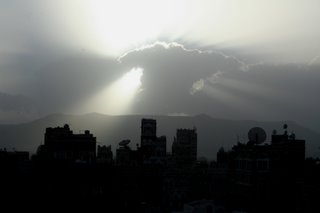Just how solid is Syria’s alliance with Iran – the partnership that Britain and the United States are now seemingly trying to break up? In my view, not very.
What unites Syria with Iran is its concern about the threat posed by their common neighbour, Iraq, the country carved from the Ottoman Empire by Winston Churchill and TE Lawrence in 1921. Iraq was made the shape it is to connect the northern oil fields around Mosul with the Gulf port of Basra in the south, and to stop the French (who then ran Syria) from meddling in the Arabian peninsula: hence Iraq's western border with Jordan ensures that Syria and Saudi Arabia do not touch. But, thus defined, Iraq combined a highly combustible mix of religious and ethnic groups which has proved a nightmare for its rulers ever since. The first, the British-backed King Feisal, complained twelve years after he was crowned that ‘There is still – and I say this with a heart of sorrow – no Iraqi people but unimaginable masses of human beings, devoid of any patriotic idea, imbued with religious traditions and absurdities connected by no common tie, giving ear to evil, prone to anarchy and perpetually ready to rise against any government whatever.’
Worried about relying on Iraq for oil, in 1982 Syria negotiated an oil-for-phosphates deal with Iran and then, with its energy supplies assured, cut its ties with Iraq. But Syria and Iran are very different: Syria is a secular dictatorship in which religious fundamentalism has been brutally crushed; Iran a theocracy with ambitions to reclaim a broad swathe of the Middle East, including parts of Iraq and Afghanistan, which it sees as historically Iranian. The population of Syria is largely Sunni, though significant to understanding the regime’s commitment to religious tolerance is the fact that the President, Bashar Assad, comes from the tiny Alawite minority. The people of Iran on the other hand, are mainly Shia. Each country has secretly backed its co-religionists in Iraq, so that Sunni and Shia are now engaged in a ferocious civil war against each other. It is an odd way for two supposed allies to behave.
Iran’s motives for supporting the Iraqi Shias were probably territorial: it would like to extend Iran westwards to the bank of the river Tigris. Syria’s motivation in backing the Sunnis was rather different. Thrown in with Iran and North Korea as an associate member of the 'Axis of Evil' from mid-2002, and fearing it might be next on the United States’ list of targets, Syria armed the Sunnis in Iraq to bog the American invasion down. To understand the Syrians' concerns, it is worth recalling Lawrence's opinion that Syria is 'a country peculiarly and historically indefensible against attack from the east'.
Viewed cold-heartedly, the Syrian policy has been a short-term success. More coalition troops have died in Iraq's western Anbar province, which borders Syria, than in any other part of Iraq and the Americans’ enthusiasm to take on Syria next has now evaporated. But when the coalition leaves, Syria's proxy war becomes a highly dangerous policy, for the Syrian border with Iraq is very porous and the violence in Baghdad is closer than Damascus would like. And the sectarian violence that will probably engulf Iraq following a US withdrawal will pit Syria directly against its supposed ally, Iran. Meanwhile, Iran's claim that it will use its nuclear weapons against Israel, which would surely leave Jerusalem, a holy Muslim city, uninhabitable sits oddly with its attempt to orchestrate anti-western opinion throughout the mostly Sunni Islamic world.
It is the realisation that a precipitate American and British withdrawal from Iraq would leave them in a confrontation with the Iranians that is encouraging the Syrians to reconsider their support for the insurgents. This helps explain the Syrian Foreign Minister Walid al-Moualem’s visit to Baghdad last week, and the reopening of diplomatic ties between the two countries for the first time since 1982. While he was in Baghdad, Moualem signed an agreement agreeing that American troops should remain in Iraq. And that shows just how vulnerable the Syrian position is.






